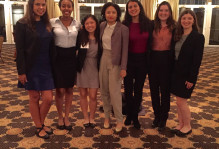Lead with Humility
Guest blogger Cameron How writes about his perspective on leading with humility.
To me, humility is generated from confidence in one’s own values, beliefs, and opinions, balanced properly with open-mindedness to others’ values, beliefs, and opinions. This concept is woven throughout the structure and scholastic exploration of this course. Humility is reflected in our readings as a core component of leadership, and it is also reflected in the way we go about engaging in controversy with civility in classroom discussion. When discussing topics as deeply entrenched and emotionally charged as politics and religion, it is essential that students feel confident enough in their beliefs, and comfortable enough in the space, to share their beliefs while leading with an open-mind and an open heart. When someone engages in this way, they do not aim to shift other people’s beliefs. When you aim to persuade, you listen in order to respond, not to understand. When you lead with humility, you seek first to understand, then to be understood.
Last summer, as part of the Leadership and Community Engagement Summer Institute, all of the students were asked to craft a “Legacy Speech” or a speech about an idea or event that had significant impact in their lives. One student shared that she had voted for Donald Trump in the 2016 Presidential election and that she was afraid to share that tidbit or her political beliefs with even her closest friends at William & Mary. She was scared of the condemnation, censure, and ostracization she knew she would face from her peers if she shared that part of her. In The Road to Character, David Brooks says, “Humility is the awareness that there’s a lot you don’t know and that a lot of what you think is distorted or wrong… It’s the moral quality of knowing what you don’t know and figuring out a way to handle your ignorance, uncertainty, and limitation.” I would go even further to say that humility handles ignorance, uncertainty, and limitation, with genuine curiosity. This notion of humility should apply to Republicans and Democrats alike, especially when engaging in dialogue. What does it say about the humility of William & Mary campus culture if a student here was too petrified to share her political beliefs, an intimate part of her identity, with even her closest friends? Simple. It is saying, we still have work to do.
Humility is a central tenet of a Quaker education, which I lived for eleven years. Humility, in the Quaker tradition, stems from the belief that there is that of God, or the divine spark, within everyone. Everyone has the capacity to have a direct relationship with God, so we should exercise confidence in our own expression of God’s light while holding a space for other people’s expression of God’s light. In A Quaker Book of Wisdom, Robert Smith wrote, “The cultivated ability to hear the voice is the most enduring value of silence. In silence we can discover the divine within, which is universally accessible but speaks to each of us in a unique voice.” Here, Mr. Smith is saying that it is only by quieting the self, or our ego, that we can truly rejoice in our own connection with God and be open to sharing in other peoples’. This notion of silence, or quieting the self, and its connection with humility is reflected in The Road to Character when the author states, “In the valley of humility they learned to quiet the self. Only by quieting the self could they see the world clearly. Only by quieting the self could they understand other people and accept what they are offering.” The Quaker tradition teaches us to quiet the self so we can exercise love and compassion and lend a listening ear to all of God’s people regardless of race, religion, sexual orientation, or political ideology.
Our class is built on fruitful classroom discussion, so it is essential every student engages with humility at the forefront and holds a safe space for beliefs and values that might be different from their own. The questions I have been reflecting on during my academic exploration of humility have been, “Do we? Does our classroom discussion operate with a sense of humility, especially with regards to politics, or do we push our own political ideologies without leaving air for contrasting political opinions?” One way to clarify this point in a classroom that is heavily liberal and heavily condemns Trump, is to ask, “Would somebody who voted for Trump feel comfortable sharing their political beliefs and voting history in our classroom space?” Based upon past rhetoric, I am compelled to say, no. This is not to say I think students in our class would not engage with this person with intentionality, humility, and civility; holding a space that is not only inclusive of, but inviting to people of contrasting political ideologies is challenging, especially in such polarized times. I look forward to using this class as an opportunity to: build my capacity for humility, learn to better hold a space for people with contrasting beliefs and values, and hopefully build a stronger sense of love, compassion, and humility across the class cohort.




No comments.
Comments are currently closed. Comments are closed on all posts older than one year, and for those in our archive.